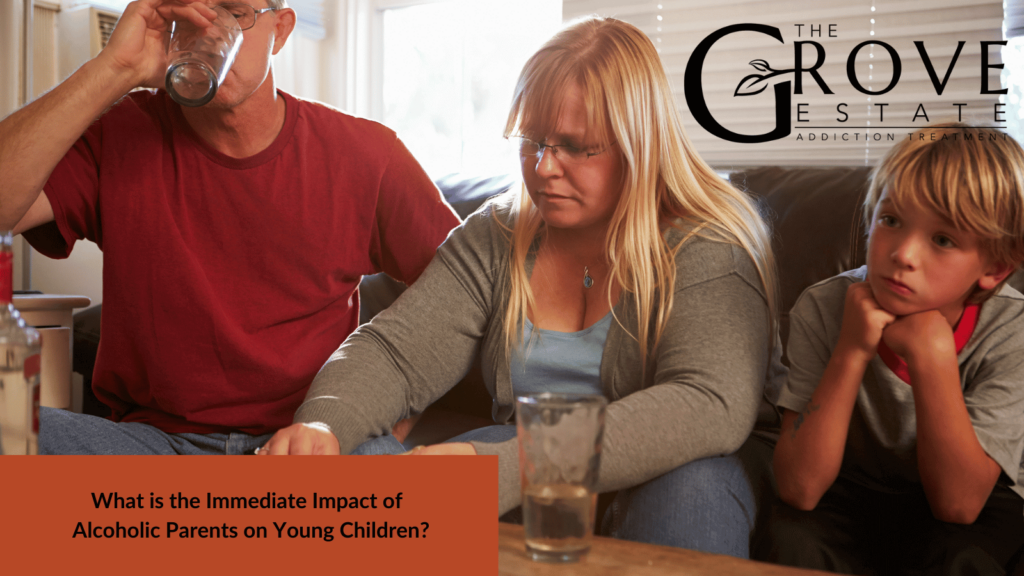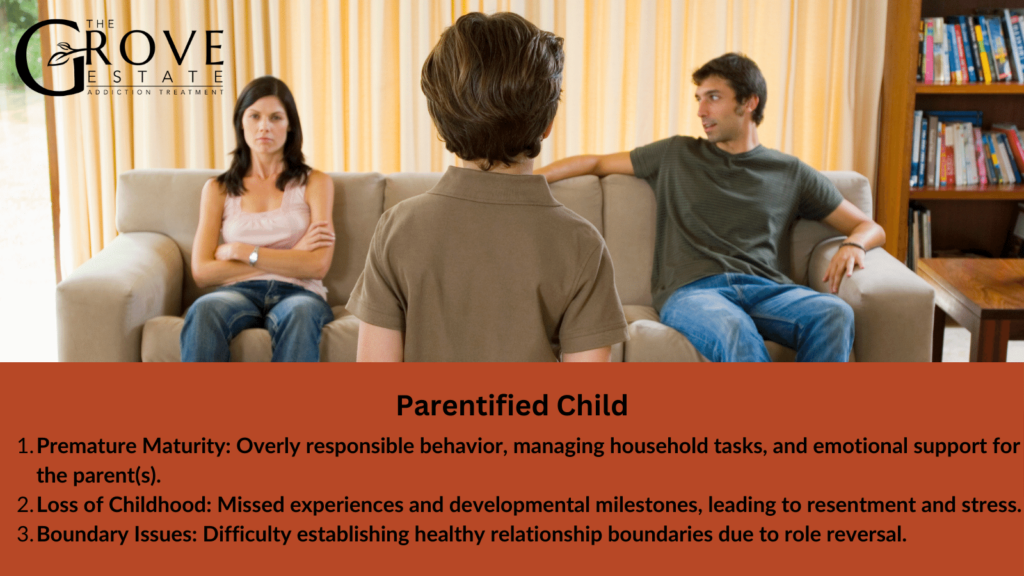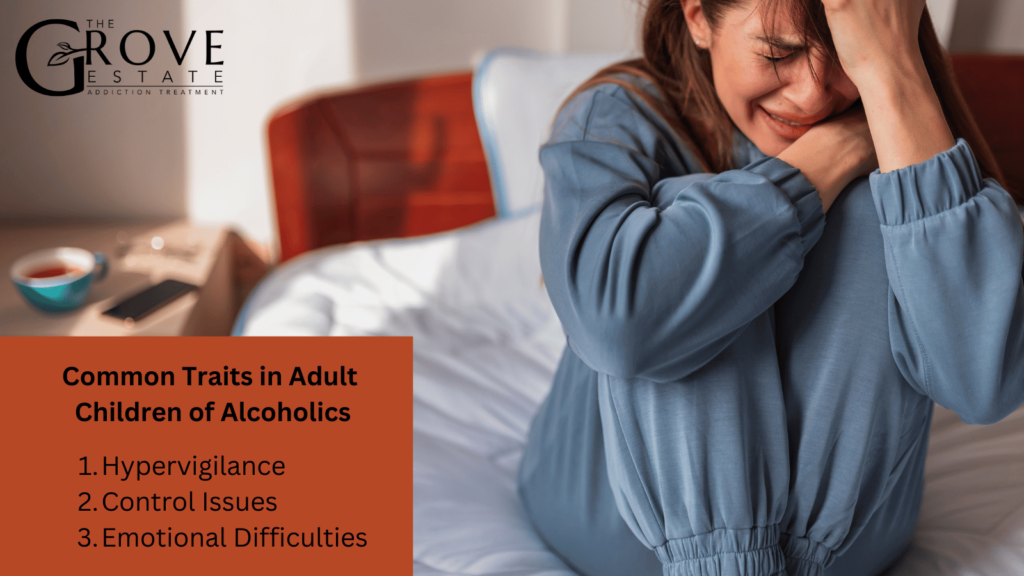Growing up with alcoholic parents can have profound and lasting effects on children, shaping their emotional, cognitive, and social development in critical ways. Children of alcoholic parents are at higher risk for a variety of challenges, including emotional distress, academic problems, and substance abuse later in life.
According to Substance Abuse and Mental Health Services Administration (SAMHSA) about 1 in 8 children in the United States, or approximately 8.7 million children, live in households with at least one parent who has a substance use disorder, including alcoholism. The widespread impact of parental alcoholism on children, emphasizes the importance of addressing and mitigating its effects through supportive interventions and resources.

What is the Immediate Impact of Alcoholic Parents on Young Children?
The immediate impact of alcoholic parents on young children, particularly toddlers, can be significant and multifaceted, affecting emotional and developmental aspects of their lives.
Toddlers are in a critical stage of emotional and psychological development. Growing up with alcoholic parents can disrupt this process in several ways:
- Emotional Instability: Young children may experience a range of confusing emotions, from fear and sadness to anger and confusion, due to the unpredictable behavior of their alcoholic parent(s). This emotional turmoil can hinder their ability to process feelings healthily.
- Developmental Delays: Exposure to alcoholism in the family can lead to delays in language, social, and cognitive development. Children may struggle with learning difficulties and exhibit behavioral problems due to the chaotic home environment.
- Attachment Issues: Secure attachment, vital for a child’s emotional and social development, may be compromised. Children with alcoholic parents often face neglect or inconsistent caregiving, leading to attachment disorders or difficulties in forming healthy relationships later in life.
Creating a stable, nurturing environment is crucial for mitigating the negative impacts of parental alcoholism on young children:
- Consistent Caregiving: Establishing routines and providing consistent care can help build a sense of security and normalcy for children in these challenging circumstances.
- Emotional Support: Providing emotional support through reliable family members, teachers, or counselors can help children understand and express their feelings in a safe and supportive setting.
- Professional Intervention: Early intervention by child development specialists, psychologists, or counselors can address developmental delays and emotional issues, promoting healthier outcomes for children affected by parental alcoholism.
Addressing the immediate impacts of alcoholic parents on young children requires a comprehensive approach that includes emotional support, stable caregiving, and professional intervention to foster resilience and healthy development.
What are the Long-Term Psychological Effects on Children?
The long-term psychological effects on children of alcoholic parents can manifest in various ways, impacting their emotional well-being, behavior, and social interactions throughout their lives.
Emotional, Behavioral, and Social Consequences
- Emotional Instability: Children raised by alcoholic parents often struggle with emotional regulation, experiencing mood swings, anxiety, depression, and low self-esteem.
- Behavioral Problems: They may exhibit behavioral issues such as aggression, impulsivity, defiance, or withdrawal, as coping mechanisms for dealing with stress and trauma.
- Academic Challenges: The emotional and behavioral difficulties can lead to academic problems, including poor performance, lack of motivation, and difficulty concentrating in school.
- Substance Abuse: Growing up in an environment where alcoholism is prevalent increases the risk of children developing their own substance abuse issues later in life.
- Social Isolation: These children may have difficulty forming and maintaining healthy relationships, experiencing social isolation, trust issues, and challenges in communication and conflict resolution.
The importance of providing support, understanding, and appropriate interventions for children affected by parental alcoholism will mitigate the negative effects and promote their overall well-being and future success.

What is a “Parentified” Child?
A “parentified” child is one who assumes adult responsibilities and caretaking roles at a young age due to their parent’s alcoholism. This can lead to:
- Premature Maturity: The child may become overly responsible, taking care of siblings, managing household tasks, or emotionally supporting the alcoholic parent(s).
- Loss of Childhood: They miss out on normal childhood experiences and developmental milestones, leading to feelings of resentment, stress, and a lack of personal identity.
- Boundary Issues: The blurred boundaries between parent and child roles can result in difficulties establishing healthy boundaries in relationships later in life.
What are the Academic and Cognitive Challenges Faced by Children?
Children of alcoholic parents often face significant academic and cognitive challenges due to the emotional stress and instability in their home environment. These challenges can have lasting effects on their educational journey and overall cognitive development.
The impact on school performance is noticeable, with many children struggling to concentrate, stay motivated, and achieve academic success. The emotional turmoil and distractions from the home environment can lead to lower grades, incomplete assignments, and difficulty focusing in class. Additionally, the cognitive development of these children may be affected, resulting in delays in language skills, problem-solving abilities, and overall cognitive functioning.
To address these challenges, academic support and interventions play a crucial role. Schools and educators can provide a supportive and understanding environment, offering resources such as counseling services, academic tutoring, and special education programs for children with learning difficulties. Individualized education plans (IEPs) can be created to accommodate the unique needs of these students and provide targeted interventions to support their academic progress.
What are the Mental Health Risks of Children with Alcoholic Parents?
Children with alcoholic parents are at increased risk of developing mental health disorders such as anxiety, depression, and PTSD due to the emotional and psychological toll of living in a chaotic environment. The stress, unpredictability, and emotional neglect associated with parental alcoholism can contribute to these disorders, impacting children’s emotional well-being and overall mental health.
Navigating the emotional and psychological impacts of having alcoholic parents can be challenging for children, leading to low self-esteem, feelings of guilt or shame, and difficulties in forming healthy relationships. Early intervention and ongoing support from mental health professionals are crucial in addressing these risks. Counseling, therapy, and support groups can equip children with coping strategies, resilience, and tools to manage their emotions effectively, creating a path towards improved mental well-being and a healthier future.
Are There Substance Use Tendencies in Children of Alcoholics?
Children of alcoholics are at a higher risk of developing substance use tendencies and addiction later in life. Growing up in an environment where substance abuse is normalized or witnessed can influence behavior and attitudes towards drugs and alcohol. Studies have shown that these children are more likely to experiment with substances and develop problematic patterns of use compared to their peers.
Preventive measures and early intervention are crucial in addressing substance use tendencies in children of alcoholics. Educating children about the risks of substance abuse, providing healthy coping mechanisms, and fostering open communication within the family can help reduce the likelihood of them following a similar path as their parents. Additionally, early identification of risk factors and access to counseling or therapy can support children in developing resilience and making healthier choices regarding substance use.

What are the Common Traits in Adult Children of Alcoholics?
Adult children of alcoholics often exhibit common traits and characteristics that stem from their upbringing in a household affected by alcoholism.
- Hypervigilance: Due to the unpredictable nature of living with alcoholic parents, adult children may develop hypervigilance, constantly monitoring their surroundings for signs of potential conflict or danger.
- Control Issues: Growing up in chaotic environments can lead to a desire for control as a way to cope with uncertainty. Adult children may struggle with controlling behaviors in various aspects of their lives.
- Emotional Difficulties: Adult children of alcoholics often face challenges in managing their emotions, experiencing mood swings, anxiety, depression, and difficulties in forming and maintaining relationships.
Healing from the long-term effects of growing up with alcoholic parents involves acknowledging these common traits and actively working towards addressing and overcoming them. This process often includes seeking therapeutic support through counseling or therapy, participating in support groups for adult children of alcoholics, engaging in self-care practices like mindfulness and exercise, and learning about the impact of parental alcoholism through educational resources.
What are some of the Coping Mechanisms Developed by Children?
Children of alcoholic parents often develop coping strategies to navigate the challenges associated with parental alcoholism. These children may seek emotional support from other family members or friends, withdraw emotionally to protect themselves from hurt, or engage in activities outside the home to distract from the chaos at home.
Healthy vs. Unhealthy Coping Mechanisms:
- Healthy coping mechanisms include seeking support, practicing self-care, setting boundaries, and expressing emotions in a healthy manner.
- Unhealthy coping mechanisms may involve substance use, self-harm, avoidance of emotions, or engaging in risky behaviors to numb pain temporarily.
Understanding the difference between healthy and unhealthy coping mechanisms is crucial in supporting children of alcoholic parents and helping them develop resilience and effective strategies for managing stress and emotions.
What is Codependency and How Does it Affect Relationship Dynamics in Families with Addiction?
Codependency refers to a dysfunctional relationship pattern where one person relies excessively on another for their sense of worth and identity, often enabling destructive behaviors such as addiction.
In a family affected by addiction, codependency might manifest as a spouse continually making excuses for their partner’s alcohol abuse, covering up missed work or social events due to intoxication. This behavior enables the addiction by shielding the individual from facing consequences and seeking help. As a result, the alcohol abuse remains unchecked, contributing to ongoing dysfunction and strain within the family unit.
Breaking the cycle of codependency in adult relationships involves recognizing unhealthy patterns, setting boundaries, seeking therapy or counseling, and developing healthier communication and coping strategies. This process is crucial for fostering healthier relationships and promoting individual well-being in families affected by addiction.
How to Support a Child with Alcoholic Parents?
Supporting a child with alcoholic parents requires a multifaceted approach that prioritizes the child’s emotional and psychological well-being. Caregivers and educators play a crucial role in creating a supportive environment by encouraging open communication, showing empathy, and establishing a consistent routine for the child. Open communication allows the child to express their feelings and concerns, fostering a sense of trust and understanding. Showing empathy helps validate the child’s experiences and emotions, reducing feelings of isolation and shame.
In addition to emotional support, teaching healthy coping skills is vital for children dealing with parental alcoholism. Educating them about healthy ways to manage stress, express emotions, and set boundaries can empower them to navigate challenging situations effectively. Seeking professional help from counselors or therapists trained in working with children of alcoholic parents can provide additional support and guidance. By implementing these strategies and educating caregivers and educators about the impact of parental alcoholism, a supportive environment can be created to promote the child’s well-being and development despite the challenging circumstances they may face.

How Can Families Find Treatment and Support?
Families seeking treatment and support have several avenues available to them. Mental health professionals specializing in family therapy can assist in addressing communication breakdowns, conflict resolution, parenting challenges, and coping with mental health disorders within the family unit. Support groups designed for families offer a safe environment to share experiences, receive empathy, and learn coping strategies. Educational programs cover topics like effective parenting techniques, stress management, and communication skills, providing valuable insights for navigating challenges. Additionally, online resources and helplines provide immediate assistance and guidance, ensuring families have access to help when needed.
When navigating conversations about alcoholism or any substance abuse issue within the family, especially concerning children, it’s crucial to approach the topic with sensitivity and age-appropriate communication. Open and honest discussions can help children understand the challenges the family may be facing, express their feelings, and ask questions. Providing reassurance, maintaining a safe environment, and emphasizing that the situation is not their fault are essential elements in these conversations. Professional guidance from therapists specializing in child psychology or support groups for families with children affected by substance abuse can also be invaluable.
How to Build Resilience in Children of Alcoholic Parents?
To build resilience in children of alcoholic parents, it’s crucial to create an environment that fosters open communication and provides a safe space for them to express their feelings and concerns. Encouraging positive coping mechanisms, such as engaging in hobbies or sports, and emphasizing healthy relationships can help strengthen their sense of self-worth and emotional stability. Teaching problem-solving skills and promoting independence also play a vital role in empowering children to develop a sense of control over their lives. Seeking professional guidance or support groups can provide additional resources and strategies tailored to the child’s specific needs, further enhancing their resilience and well-being.
What are the 4 types of children of alcoholics?
Children of alcoholics are often categorized into four types: the responsible child, the adjuster, the placater, and the acting-out child.
What developmental issues do children of alcoholics have?
Children of alcoholics may experience developmental issues such as low self-esteem, difficulties with trust and relationships, and emotional regulation challenges.
How does alcoholism affect offspring?
Alcoholism can have a profound impact on offspring, leading to increased risk of substance abuse, mental health disorders, and behavioral problems.
Are children of alcoholics more likely to be depressed?
Yes, children of alcoholics are more likely to experience depression due to the complex interplay of genetic, environmental, and psychological factors.
What do children of alcoholics have in common?
Children of alcoholics often share common experiences such as feelings of shame, guilt, and insecurity, as well as challenges in coping with stress and trauma.
What are the effects of parental alcoholism on children’s coping mechanisms?
Parental alcoholism significantly influences the development of coping mechanisms in children, shaping how they deal with stress and emotional pain throughout their lives. Children of alcoholic parents might adopt a range of coping strategies, from healthy ones like seeking support and expressing emotions constructively to unhealthy ones such as substance use or withdrawal. The chaotic and unpredictable home environment forces these children to adapt in ways that can either foster resilience or lead to maladaptive behaviors.
On the other hand, understanding the nature of alcoholism is crucial in addressing these coping mechanisms effectively. Alcohol is a drug, and recognizing this fact can demystify many aspects of an alcoholic parent’s behavior for a child. By reframing their parent’s condition within the context of addiction, children and their supporters can approach the situation with greater empathy and awareness, potentially guiding the child towards healthier coping strategies. This shift in perception is a vital step in fostering a supportive environment that encourages positive development despite adverse circumstances.
Children with alcoholic parents often carry the burden of their family’s struggles into adulthood, affecting their relationships and personal growth. These children may benefit from targeted support and interventions aimed at mitigating the negative impacts of growing up in an alcoholic household. Engaging with an aftercare facility can provide children and their families with the resources and support needed to navigate the complexities of recovery and healing. Such facilities offer programs that focus on building resilience, understanding addiction, and developing healthy coping mechanisms, laying the groundwork for a more stable and hopeful future.

Share This Post



